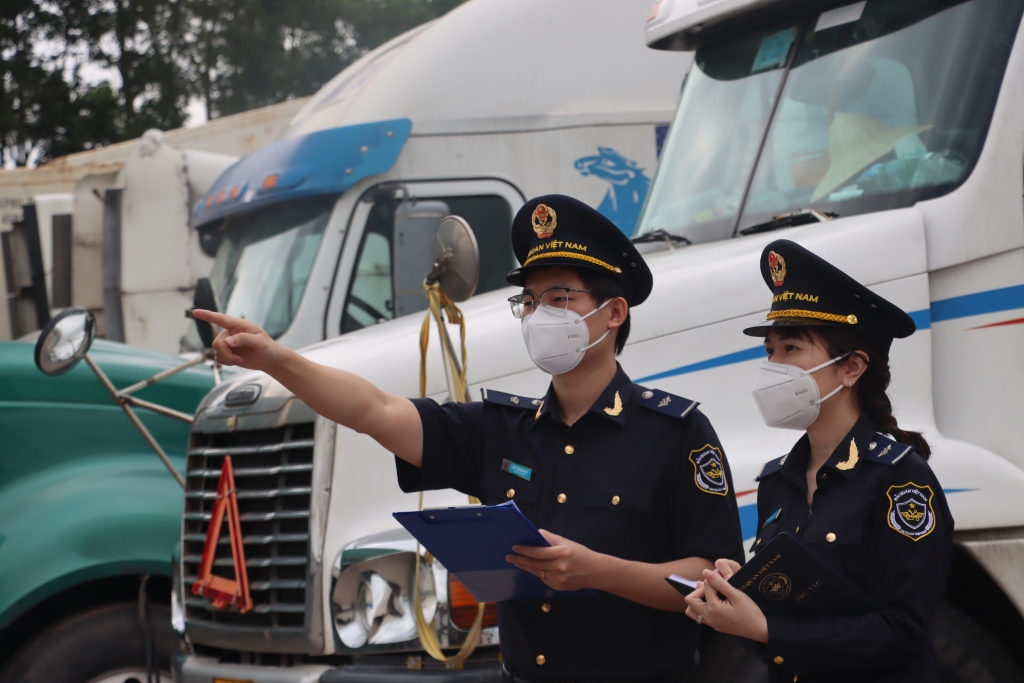Duties and powers of customs officials in Vietnam
Who are customs officials? What are the duties and powers of customs officials in Vietnam? – Phuong Nha (Khanh Hoa)

Duties and powers of customs officials in Vietnam (Internet image)
Regarding this matter, LawNet would like to answer as follows:
1. Who are customs officials?
Customs officials are those who are qualified for being recruited, or appointed to ranks, positions or titles in customs authorities; and being trained, managed and employed in accordance with the laws on officials.
(Clause 1, Article 15 of the Law on Customs 2014)
2. Tasks and entitlements of customs officials in Vietnam
- Strictly adhere to laws and customs operation processes and take responsibility for the performance of their tasks and exercise of their entitlements.
- Instruct customs declarants and related entities on request.
- Conduct customs inspection and supervision; supervise the packing, unpacking, transshipment, loading and unloading of cargoes at places where the customs formalities are made and places where the imported and exported goods are verified. In case of detecting violation against law on customs, request owners of goods or vehicle, commanders or vehicle operators or authorized persons to comply with their requests for the inspection goods and vehicle in accordance with this Law and the law on handling of administrative violations.
- Take samples of goods in the presence of customs declarants in order for customs authorities to analyze or request an assessment of such goods.
- Request customs declarants to provide information and documentary evidence related to their goods in order to ensure accuracy of HS codes, origin and customs value of goods.
- Request vehicle commanders or operators to drive in proper routes, on schedule, and stop at proper places.
- Other tasks and entitlements as prescribed in law.
(Article 19 of the Law on Customs 2014)
3. Prohibited acts of customs officials in Vietnam
- Causing troubles and difficulties when following customs formalities;
- Screening or colluding with others in smuggling or illegally transporting goods across the border, committing trade or tax fraud;
- Taking bribes, appropriating or embezzling temporarily seized goods or other acts for self-seeking purposes;
- vvOther violations against the law on customs.
(Clause 1, Article 10 of the Law on Customs 2014)
4. Rights and obligations of customs declarants in Vietnam
- A customs declarant shall have rights to:
+ Be provided by customs authorities with information about customs declaration for goods, vehicle, guidance on carrying out customs formalities, and laws on customs;
+ Request customs authorities to predetermine HS codes, origin and customs value of goods when providing sufficient and accurate information to customs authorities;
+ Preview goods, take samples of the goods under the supervision of customs officials before making customs declaration in order to ensure accurate customs declaration;
+ Request customs authorities to re-verify goods if they disagree with customs authorities’ decisions provided that such goods have not been granted clearance;
+ Use customs documents for customs clearance or good transportation or following related formalities at other competent agencies in accordance with law;
+ Make complaints and denunciations about illegal acts against customs authorities and customs officials;
+ Claim compensation for damage caused by customs authorities and customs officials in accordance with the law on State compensation liability.
- Customs declarants who are owners of goods or vehicle shall have obligations to:
+ Make customs declarations and follow customs formalities in accordance with the Law on Customs 2014;
+ Provide sufficient and accurate information in order for customs authorities to predetermine HS codes, origin and customs value of goods;
+ Take legal responsibility for the authenticity of statement declared and documentary evidence submitted; information consistency between dossiers kept at enterprises and dossiers kept at customs authorities;
+ Follow decisions and requests of customs authorities and customs officials during conducting customs formalities, inspection and supervision of goods and vehicle;
+ Keep customs documents records of goods which are granted clearance within 05 years from the day on which the declaration of such goods is register, unless otherwise provided by law; keep accounting books and documentary evidence and other documents related to imported and exported goods which are granted clearance for a time limit in accordance with law; submit related dossiers, information and documents for verification at the request of customs authorities as prescribed in Articles 32, 79 and 80 of the Law on Customs 2014;
+ Dispose manpower and equipment to perform relevant jobs in order for the customs officials verify goods and vehicle;
+ Pay taxes and fulfill other financial liabilities in accordance with the laws on taxes, charges and fees and other corresponding regulations of laws.
- Customs declarants who are customs brokers or other persons authorized by owners of goods and vehicle shall comply with obligations prescribed in Points a, b, c, d, e and g, Clause 2 of this Article within the scope of authorization. Customs declarants who are vehicle operators shall comply with obligations prescribed at Points a, c, d, e and g, Clause 2 of Article 18 of the Law on Customs 2014.
(Article 18 of the Law on Customs 2014)
- Key word:
- customs officials
- in Vietnam
- Cases of land rent exemption and reduction under the latest regulations in Vietnam
- Economic infrastructure and social infrastructure system in Thu Duc City, Ho Chi Minh City
- Regulations on ordination with foreign elements in religious organizations in Vietnam
- Increase land compensation prices in Vietnam from January 1, 2026
- Determination of land compensation levels for damage during land requisition process in Vietnam
- Who is permitted to purchase social housing according to latest regulations in Vietnam?
-

- Emergency response and search and rescue organizations ...
- 10:29, 11/09/2024
-

- Handling of the acceptance results of ministerial ...
- 09:30, 11/09/2024
-

- Guidance on unexploded ordnance investigation ...
- 18:30, 09/09/2024
-

- Sources of the National database on construction ...
- 16:37, 09/09/2024
-

- General regulations on the implementation of administrative ...
- 11:30, 09/09/2024
-

- Notable new policies of Vietnam effective as of ...
- 16:26, 11/04/2025
-
.Medium.png)
- Notable documents of Vietnam in the previous week ...
- 16:21, 11/04/2025
-
.Medium.png)
- Notable documents of Vietnam in the previous week ...
- 16:11, 02/04/2025
-
.Medium.png)
- Notable new policies of Vietnam to be effective ...
- 16:04, 02/04/2025
-
.Medium.png)
- Notable new policies of Vietnam effective from ...
- 14:51, 21/03/2025

 Article table of contents
Article table of contents
